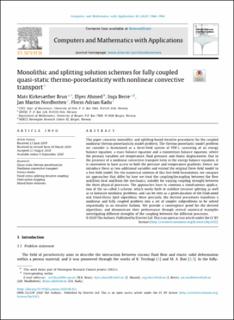Monolithic and splitting solution schemes for fully coupled quasi-static thermo-poroelasticity with nonlinear convective transport
Peer reviewed, Journal article
Published version
Permanent lenke
https://hdl.handle.net/11250/2725053Utgivelsesdato
2020Metadata
Vis full innførselSamlinger
Originalversjon
Computers and Mathematics with Applications. 2020, 80 (8), 1964-1984. 10.1016/j.camwa.2020.08.022Sammendrag
This paper concerns monolithic and splitting-based iterative procedures for the coupled nonlinear thermo-poroelasticity model problem. The thermo-poroelastic model problem we consider is formulated as a three-field system of PDE’s, consisting of an energy balance equation, a mass balance equation and a momentum balance equation, where the primary variables are temperature, fluid pressure, and elastic displacement. Due to the presence of a nonlinear convective transport term in the energy balance equation, it is convenient to have access to both the pressure and temperature gradients. Hence, we introduce these as two additional variables and extend the original three-field model to a five-field model. For the numerical solution of this five-field formulation, we compare six approaches that differ by how we treat the coupling/decoupling between the flow and/from heat and/from the mechanics, suitable for varying coupling strength between the three physical processes. The approaches have in common a simultaneous application of the so-called -scheme, which works both to stabilize iterative splitting as well as to linearize nonlinear problems, and can be seen as a generalization of the Undrained and Fixed-Stress Split algorithms. More precisely, the derived procedures transform a nonlinear and fully coupled problem into a set of simpler subproblems to be solved sequentially in an iterative fashion. We provide a convergence proof for the derived algorithms, and demonstrate their performance through several numerical examples investigating different strengths of the coupling between the different processes.

